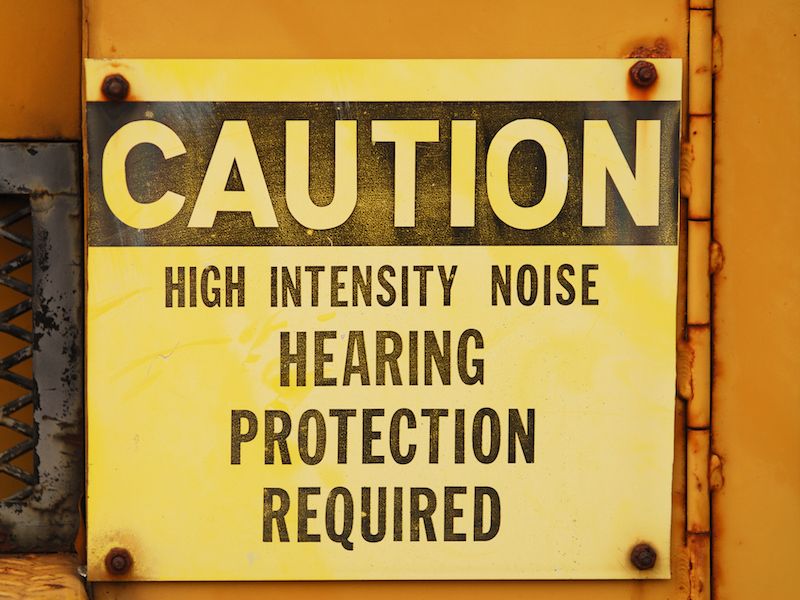
Understanding you should protect your ears is one thing. Knowing when to safeguard your ears is another matter. It’s more difficult than, for example, knowing when you need sunscreen. (Are you going to go outside? Is there sunlight? You should be using sunblock.) It’s not even as easy as recognizing when to use eye protection (Doing some hammering? Cutting some wood or working with hazardous chemicals? Use eye protection).
It can feel like there’s a large grey area when addressing when to use ear protection, and that can be detrimental. Usually, we’ll defer to our normal inclination to avoid hearing protection unless we’re given information that a specific activity or place is dangerous.
Risk Assessments
In general, we’re not very good at assessing risk, especially when it comes to something as intangible as damage to the ears or the possibility of permanent sensorineural hearing loss. Here are some examples to demonstrate the situation:
- Person A goes to a very loud rock concert. The concert lasts roughly 3 hours.
- Person B runs a landscaping company. She spends a significant amount of time mowing lawns, then goes home to a quiet house and reads.
- Person C is an office worker.
You might believe the hearing hazard is higher for person A (let’s just call her Ann). Ann leaves the show with her ears ringing, and she’ll spend the majority of the next day, trying to hear herself speak. Assuming Ann’s activity was dangerous to her ears would be sensible.
The noise that person B (let’s just call her Betty), is exposed to is not as loud. There’s no ringing in her ears. So it must be less hazardous for her hearing, right? Not necessarily. Because Betty is mowing every day. Actually, the damage builds up a little at a time even though they don’t ring out. If experienced too often, even moderately loud sounds can have a detrimental affect on your hearing.
What’s going on with person C (let’s call her Chris) is even harder to sort out. Lawnmowers have instructions that emphasize the risks of continued exposure to noise. But even though Chris has a relatively quiet job, her long morning commute on the train each day is fairly loud. Additionally, while she works at her desk all day, she listens to her music through earbuds. Is protection something she should consider?
When is it Time to be Concerned About Safeguarding Your Hearing?
Generally, you should turn the volume down if you have to shout to be heard. And you really should consider wearing earmuffs or earplugs if your surroundings are that noisy.
If you want to think about this a little more scientifically, you need to use 85dB as your limit. Sounds above 85dB have the capacity to cause damage over time, so in those situation, you should think about using hearing protection.
Your ears don’t have a built-in decibel meter to warn you when you reach that 85dB level, so countless hearing specialists recommend obtaining specialized apps for your phone. You will be able to take the correct steps to safeguard your hearing because these apps will inform you when the sound is reaching a harmful volume.
A Few Examples
Even if you do get that app and bring it with you, your phone might not be with you everywhere you go. So we might develop a good standard with a few examples of when to protect our ears. Here we go:
- Domestic Chores: Even mowing a lawn, as previously explained, requires hearing protection. Cutting the grass is a good example of the sort of household chore that might cause damage to your ears but that you most likely don’t think about all that often.
- Exercise: You know your morning spin class? Or perhaps your daily elliptical session. Each of these cases might require ear protection. Those trainers who use microphones and sound systems (and loud music) to motivate you may be good for your heart rate, but all that volume is bad for your ears.
- Driving & Commuting: Spending all day as an Uber or Lyft driver? Or perhaps you’re just hanging around downtown for work or getting on the train. The noise of living in a city is bad enough for your ears, not to mention the added injury caused by cranking up your music to drown out the city noise.
- Operating Power Tools: You understand that working every day at your factory job is going to necessitate hearing protection. But how about the hobbyist building in his garage? Even if it’s only a hobby, hearing specialists recommend wearing hearing protection if you’re operating power equipment.
- Listening to music with earbuds. OK, this doesn’t call for protection but does require caution. Give consideration to how loud the music is, how long you’re listening to it, and whether it’s going directly into your ears. Noise-canceling headphones are a great choice to prevent having to turn the volume way up.
These examples may give you a good baseline. When in doubt, though, you should defer to protection. Rather than leaving your ears exposed to future harm, in most circumstances, it’s better to protect your hearing. If you want to be able to hear tomorrow, protect today.

